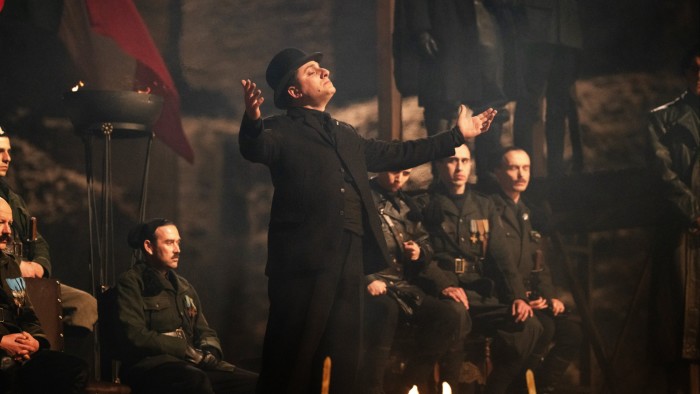Summarize this content to 2000 words in 6 paragraphs in Arabic Unlock the Editor’s Digest for freeRoula Khalaf, Editor of the FT, selects her favourite stories in this weekly newsletter.Benito Mussolini is standing on a stage, taking in the cheers of a room full of boisterous men, when he suddenly turns round and looks straight at us. “You’ll love me too,” he declares with a smirk. “You’ll become fascists too.”So begins Mussolini: Son of the Century, a bracingly unconventional drama charting the ascent of Italy’s fascist movement in the early 1920s. Adapted from the first book in Antonio Scurati’s titular tetralogy, the eight-part series is not so much a recap of history as an immersion in a time and place. It is also less a biography than an uncomfortably intimate encounter with the man himself. He confides in us directly as if we were there with him, present and complicit, as he rises from rabble-rousing newspaper editor to Il Duce. This daring, provocative approach comes from director Joe Wright, who showed little taste for either in period dramas such as Pride & Prejudice and Atonement or his 2017 Winston Churchill biopic Darkest Hour.Where the latter was a sentimental ode to heroism, Son of the Century is a complex portrait of evil. It draws on everything from Futurist art, the cinema of Federico Fellini and Paolo Sorrentino and techno. If that sounds incongruous on the page, it is utterly electrifying on the screen.So too is series lead Luca Marinelli, uncanny as Mussolini with his jutting jaw, simian posture and resonant voice. He not only captures the strongman’s imposing physicality and rhetorical power, but peels back the layers to reveal the anatomy of Mussolini’s monstrous machismo — his insecurities and the personal frustrations he violently avenged.The series also strives to show how and why he was able to seduce millions. While there are plenty of scenes of impassioned rallies and image building, it’s the little asides to camera that really give us a sense of what those “lost people” who were swept up by him felt: that he was speaking to them directly, involving them in his triumphs. This meta component also reinforces the image of Mussolini as a protean actor who got where he did by turning the political arena into a theatre and casting himself as its star. We see him adopt various guises: agitator, orator, statesman, savage. He is, we are told: “Everything and the opposite of everything.” And so, whenever strategy fails him (as it often does), we see him turn to stagecraft — most notably in October 1922 when he orders the Blackshirts (his thuggish private militia) to march on Rome despite knowing full well that they have no chance against the state army. The bluff works, the king and creaking government flinch and, at 39, Mussolini, the son of a socialist blacksmith, is appointed leader. Just three years earlier in the 1919 election, his fascists had failed to secure a single seat. It hardly needs saying that another populist demagogue, newly returned to power, looms large over this series, even before Mussolini vows to “make Italy great again”. How quickly democracy can be dismantled, Son of the Century warns. ★★★★★Sky Atlantic from February 4 at 9pm. Streaming in full on Now from the same day
رائح الآن
rewrite this title in Arabic Mussolini: Son of the Century TV review — daring series warns how quickly democracy is dismantled
مال واعمال
مواضيع رائجة
النشرة البريدية
اشترك للحصول على اخر الأخبار لحظة بلحظة الى بريدك الإلكتروني.
© 2026 جلوب تايم لاين. جميع الحقوق محفوظة.









